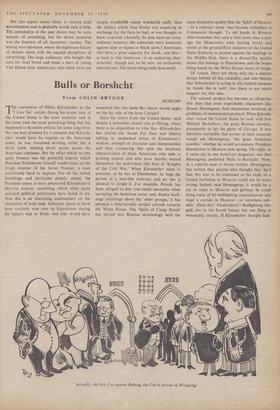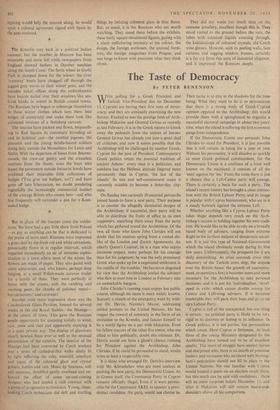Bulls or Borshcht
From COLIN BRYGGE MOSCOW MHE conversion of Nikita Khrushchev to the I 'I Like Ike' cultists during his recent tour of the United States is the most eccentric and at the same time the most promising thing that has happened to Kremlin politics for some long time. No one here doubted for a moment that Khrush- chev would leave his imprint on the American scene; he was visualised arriving rather like a burly lunik, sending, shock waves across the American continent. But the effect which no one quite foresaw was the powerful imprint which President Eisenhower himself would make on the tough exterior of the Soviet Premier, a man notoriously hard to impress. For all his verbal fumblings and platitudes • piously stated, the President seems to have penetrated Khrushchev's Marxist armour, something which other more polished political performers have failed to do. And this is an interesting commentary on the characters of both men. Adenauer seems to have been similarly won over by Eisenhower during the latter's visit to Bonn—but who would have suspected that the same Ike charm would apply on the far side of the Iron Curtain?
Since his return from the United States—and despite a somewhat muted visit to Peking, where there is no disposition to Like Ike—Khrushchev has toured the Soviet Far East and Siberia talking in unabashed terms of Eisenhower's wisdom, strength of character and statesmanship and then comparing this with the invidious characteristics of those Americans who seek to prolong tension and who have thereby earned themselves the ambivalent title here of 'Knights of the Cold War.' When Khrushchev takes to someone, as he has to Eisenhower, he hugs the person in 'a bear-like embrace, and no one is allowed to forget it. For example, Pravda has been obliged to don rose-tinted spectacles when surveying the American scene; and, despite back- page rumblings about the 'other groups,' it has adopted a determinedly cordial attitude towards the White House. The 'Spirit of Camp David' has moved into Russian terminology with the same distinctive quality that the 'Spirit of Munich' —in a contrary sense—has become embedded in Communist thought. To old hands in Moscow who remember that only a little more than a year ago the Muscovites were hurling bricks and stones at the ground-floor windows of the United States Embassy to protest against the landings in the Middle East, there is a dream-like quality about this homage to Eisenhower and the hopes being based on the White House views of things.
Of course, there are those who see a sinister design behind all this cordiality, and who believe that Khrushchev is acting in this fashion because he thinks Ike is `soft'; but there is not much support for this idea.
The summit project has become so all-perva- sive here that even improbable characters like Ernest Hemingway find themselves involved in problems of international protocol. When Khrush- chev visited the United States he took with him Mikhail Sholokhov, the great Russian novelist, presumably to lay the ghost of Zhivago. It was therefore inevitable that sooner or later someone would ask Hemingway, 'the great American novelist,' whether he would accompany President Eisenhower to Moscow next spring. The reply, as it came out in one American magazine, was that Hemingway preferred 'Bulls to Borshcht.' Now, in a contrite note to Soviet writers, Hemingway has written that anyone who thought (ha! ha!) that this was to be construed as his reply to a formal invitation to Moscow could not be more wrong. Indeed, said Hemingway, it would be a joy to come to Moscow and perhaps he could bring some of his bullfighting acquaintances and stage a corrida in Moscow—`or anywhere suit- able.' Alma Ata? Vladivostock? Bullfighting, like golf, lies in the Soviet future, but one thing is reasonably certain. If Khrushchev thought bull- 'Actually, old boy, against Betting, but I'm in favour of Whipping.' fighting would help the summit along, he would want a cultural agreement signed with Spain by the next weekend.
* The Kremlin may bask in a political Indian summer, but the weather in Moscow has been miserable and snow fell while newspapers from England showed bathers in October sunshine along the South Coast. The ferris wheel in Gorki Park is clamped down for the winter; the river 'tramway' boats have chugged off through the jagged grey waves to their winter pens; and the wooden ticket offices along the embankments have boards nailed over their .windows like sea- front kiosks in winter in British coastal towns. The Russians have begun to submerge themselves in those winter clothes which turn them into bulges of anonymity`, and make them look like animated versions of a Steinberg cartoon.
The tourists have packed and flown, bequeath- ing to Red Square its customary brooding air and its habitual cast—the overfed pigeons, the peasants and the young bristle-haired soldiers doing duty outside the Mausoleum for Lenin and Stalin. With the departure of buses from Bourne- mouth, the crew-cut gentry and the creaseless matrons from the States, even the boys who haunt the pavements outside Intourist hotels have pocketed their miserable little collections of badges ('You give me ballpen, no?') and have gone oil into hibernation, no doubt pondering regretfully the increasingly commercial instinct of the average Briton who comes here—and who less frequently will surrender a pen for a Kom- somol badge.
But in place of the tourists come the exhibi- tions. We have had a gay little show from Poland ---as gay as anything can be that is dedicated to the praise of more steel. Russians were impressed a great deal by the fresh red and white carnations, presumably flown in at regular intervals, which imparted immediately an air of immense sophis tication to a town where most of the winter the flowers are made of paper. They also gazed with silent admiration, and, who knows, perhaps deep longing, at a small Polish-made caravan trailer for a family of three. They were perfectly at home with the cranes, with the swishing and meshing gears, the chunks of polished metal— but carnations! and caravans!
Another even more impressive show was the Czechoslovak Glass Pavilion, housed for several weeks in the old Royal Stables—the Manege- in the centre of town. This gave the Russians ample opportunity for queueing stolidly in wind, rain, snow and sleet and apparently enjoying it in a quiet private way. The display of glassware clearly bowled them over as well as the unusual presentation of the exhibits. The interior of the Manege had been converted by Czech workers into a series of cathedral-like walks dimly lit by light reflecting the ruby, emerald, amethyst and topaz of the coloured glass and crystal goblets, bottles and vats. Music by Smetana, soft and sonorous. throbbed gently overhead and en- hanced the effect of some up-and-coming designer who had landed a rich contract with a group of progressive ecclesiastics. Young, clean- looking Czech technicians did deft and startling things by twisting coloured glass in blue flame. But, as usual, it is the Russians who are worth watching. They stand there before the exhibits, these burly square-shouldered figures, gazing with a silent unflickering intensity at the colour, the design, the foreign workmen, the unusual furni- ture, the foreign magazines from Prague; and one longs to know with precision what they think about. They did not waste too much time on the costume jewellery, excellent though this is. They stood rooted to the ground before the vats, the tubes with coloured liquids coursing through, the kaleidoscope of coloured crystals, old Czech wine glasses. Moscow, with its peeling walls, lace curtains and sagging window frames, certainly is a far cry from this aura of industrial elegance; and it impressed the Russians deeply. ,







































































 Previous page
Previous page